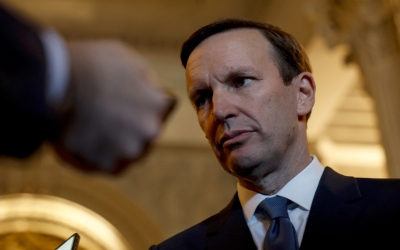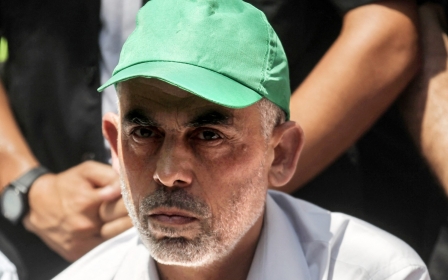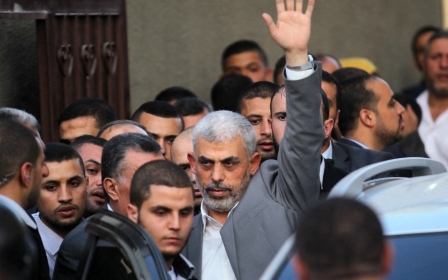Was Yahya Sinwar the obstacle to peace the US made him out to be?

The US dubbed the late Hamas chief Yahya Sinwar as an “insurmountable obstacle” to a ceasefire in the Gaza Strip, but Sinwar’s killing is likely to lift the veil on Israel’s ambitions to continue its war on Gaza.
US officials told Middle East Eye on Thursday that Sinwar’s death in a firefight with Israeli troops could energise ceasefire talks, and that the US had already reached out to Qatar and Egypt to see if negotiations could be rekindled.
But analysts say Sinwar’s death is unlikely to have a major impact on the talks because it does little to change Israel’s motivations to keep pummelling the besieged enclave, in fact, it may bolster those efforts.
“Sinwar was certainly an obstacle to a deal, but the main obstacle has been Netanyahu, who has assassinated, and escalated this war, at every opportunity,” Khaled Elgindy, the Middle East Institute’s director of Israel-Palestine affairs, told Middle East Eye.
“If Sinwar was the main reason we didn’t have a deal, it begs the question, with him out of the picture, why isn’t the path clear?”
New MEE newsletter: Jerusalem Dispatch
Sign up to get the latest insights and analysis on Israel-Palestine, alongside Turkey Unpacked and other MEE newsletters
Since President Joe Biden took an unprecedented step in May to unveil a three-phase ceasefire deal from the White House, optimism about a deal has ebbed and flowed until the deal disappeared altogether.
Already, the White House appears to be curbing the enthusiasm it channelled on Thursday about the prospects of reviving a deal.
On Friday, Biden said the US may be able to end fighting in Lebanon between Hezbollah and Israel, but a ceasefire in Gaza is "going to be harder".
Israel's unacceptable terms
In negotiations, Hamas and Israel have both staked out hardline positions at times, analysts say, changing intricate details and squabbling over the timing of prisoner releases and troop withdrawals.
Sinwar - who was on the ground commanding troops in Gaza, as opposed to much of Hamas’s political leadership based in Qatar - was considered a hardliner and a deciding vote on any deal.
Analysts say that from Sinwar’s strategic perspective, Hamas, which has ruled the enclave since 2007, had time on its side to press its case in talks because Israel positioned itself into a permanent war footing after 7 October 2023 and had grown more isolated on the world stage as a result of its devastating bombing campaign on Gaza.
But Marwan Muasher, Jordan’s former ambassador to Israel, said the US’s failure to achieve a ceasefire was due to more factors than the “personality of Sinwar”.
'No Palestinian leader could accept what Israel wants to impose'
- Marwan Muasher, former Jordanian ambassador to Israel
“There are fundamental gaps between Hamas and Israel.”
Not the least of which are steps Israel has taken to ensure the groundwork for a permanent occupation of the Gaza Strip over the last year.
Israel has destroyed swaths of residential housing to create a buffer zone along Gaza’s perimeter with Israel.
It has also entrenched troops in two strategic slivers of land: the Philadelphi Corridor, a 14km strip of land between Gaza and Egypt that Israel said Hamas has used to smuggle weapons, and the Netzarim Corridor, a narrow zone that Israel carved out to separate northern and southern Gaza.
Another of Israel’s overarching motivations throughout the ceasefire talks has been to protect its demand that it can resume fighting in Gaza whenever it wants, even after Hamas returns the hostages it grabbed in the 7 October 2023 Hamas-led attacks on southern Israel.
Israel has offered tactical concessions to Hamas to get its hostages back, but its steps to occupy Gaza and refusal to agree to a permanent cessation of hostilities have been the main roadblocks to a ceasefire, experts say.
“No Palestinian leader could accept what Israel wants to impose. And especially one in Hamas. Israel is saying to Hamas, ‘You need to release all the hostages and after you do that we will go back in and kill you'. Sinwar does not have to be alive for Hamas to reject that.”
'An integral part of Gaza's social fabric'
Yet by the spring of 2024, Hamas had agreed to most of Israel’s conditions. The group was under pressure. Israel had effectively isolated Gaza after seizing Rafah in May, famine had set across parts of the territory and two-thirds of its buildings had been damaged or destroyed.
It was Hamas’s flexibility that created space for a deal.
The US dispatched its top negotiator, CIA director Bill Burns, to Rome to meet Israeli, Qatari and Egyptian officials. The US relies on its two Arab partners to communicate with Hamas, which it considers a terrorist organisation. Israel backtracked on concessions it had made to pull out troops from parts of Gaza, including the Philadelphi Corridor, MEE reported at the time.
Then on 31 July, Israel killed the Hamas chief at the time, Ismail Haniyeh, in a brazen attack on Tehran. The killing raised a question: Why did Israel kill a Hamas leader who was willing to negotiate a deal that was so close to the finish line?
The US blamed Hamas when the talks collapsed but critics of the Biden administration say the US has failed to use its most powerful form of leverage with its ally to coerce it back to the negotiating table.
Since 7 October 2023, it has provided Israel with $17.9bn in military aid and has come directly to its defence twice after being attacked by Iran. The US was never going to meet Hamas on the same terms as its ally Israel, but analysts have questioned how effective a mediator the US can be if it imposes no costs on Israel for backtracking during ceasefire talks.
“Despite America’s wishful thinking and genuineness of wanting a ceasefire, it won’t happen. That is because the US is fine with it being on the terms Israeli wants it on,” Fawaz Gerges, a professor of international relations at the London School of Economics, told MEE.
There is precedent for the US withholding arms to Israel. US President Ronald Reagan halted the delivery of artillery shells and cluster bombs when Israel invaded Lebanon in 1982. The following year, he conditioned the transfer of F-16s on Israel’s military withdrawal from Lebanon.
US officials who spoke with MEE say the administration believes there is now a narrow window for a ceasefire because Sinwar’s death weakens Hamas further.
For Gerges, that view only underscores why the US has come up short trying to clinch an agreement in the first place.
“What the Americans and Israelis believe is that the killing of Sinwar rattles and shocks Hamas enough that they surrender under shattering fire and their day-after plan is a Gaza that is cleansed of Hamas. But Hamas is an integral part of Gaza’s social fabric.”
Even the US’s Arab partners - who look down on Hamas as a dangerous, populist, Islamist movement - have tried to engage the group. That includes the UAE, which has publicly said it will commit troops to Gaza as part of a post-war plan.
The UAE’s point person on Gaza is Palestinian strongman Mohammed Dahlan, a former Palestinian Authority leader who has some ties to Hamas officials.
But Sinwar’s death may only harden Israel’s positions on Hamas and Gaza. On Thursday, Israelis celebrated in the streets when Sinwar's death was announced.
Israelis were left scarred by the 7 October 2023 attacks, but the Israeli public was also drifting further rightward before the war on Gaza erupted. Talks on a two-state solution have been effectively dead for years.
The influential US Senator Chris Murphy recently said that Netanyahu's hold on power rests on avoiding a Gaza ceasefire, and there is little doubt that the war has revived Israeli Prime Minister Benjamin Netanyahu's political fortunes.
“Netanyahu is riding high in the polls and regained everything he lost. He has no interest in a ceasefire,” Muasher said.
Middle East Eye delivers independent and unrivalled coverage and analysis of the Middle East, North Africa and beyond. To learn more about republishing this content and the associated fees, please fill out this form. More about MEE can be found here.





